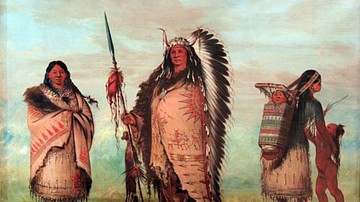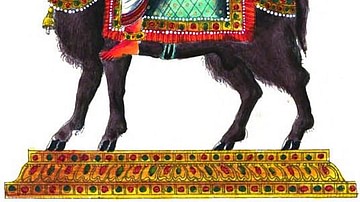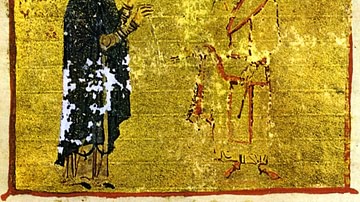Search
Remove Ads
Advertisement
Summary 
Loading AI-generated summary based on World History Encyclopedia articles ...
Search Results

Image
Kappa in front of a Store in Tokyo
Kappa mascot in front of a Store in Tokyo.

Definition
Sioux
The Sioux are a native North American nation who inhabited the Great Plains region of, roughly, modern Colorado, Montana, Nebraska, North Dakota, South Dakota, and Wyoming. They are one of the many nations referred to as Plains Indians who...

Video
Life of Emperor Nerva #12 First of the Best Emperors
Emperor Nerva is the first of the 'Five Good Emperor'. However, his reign proved to be fairly lackluster and he only reigned for 15 months and during his short time on the throne, his Praetorian Guards took him hostage and forced him to give...

Definition
Agni
Agni is the Hindu god of fire. He is regarded as the friend and protector of humanity, in particular, he safeguards the home. Various forms of fire are associated with Agni and include the sun, lightning, comets, sacrificial fire, domestic...

Definition
Scythian Religion
Scythian religion appears to be an amalgam of belief in a pantheon of gods grafted to more ancient animal reverence and shamanistic practice. According to their burial finds, the Scythians appear to have had a deep affinity with the animals...

Definition
Parthian Culture
Stretching between China and India in the east to the Mediterranean in the west, Parthia ruled over one of the widest expanses of empire in its time and Parthian culture flourished for 500 years (247 BCE to 224 CE). While known for their...

Definition
Michael Psellos
Michael Psellos (1018 - c. 1082 CE) was a Byzantine historian, writer, and intellectual. Michael acted as courtier and advisor to several Byzantine emperors, and he was the tutor of Michael VII. Writing between 1042 and 1078 CE, his texts...

Definition
Harriet Jacobs
Harriet Jacobs (l. c. 1813-1897) was a former slave, abolitionist, and author of Incidents in the Life of a Slave Girl (1861), her autobiography, describing her life as a slave in North Carolina, her flight to freedom in the North, and her...

Article
Sioux Life Lessons: Iktomi and the Muskrat & Iktomi's Blanket
The Sioux stories known as Iktomi tales concern the trickster figure Iktomi (also known as Unktomi) who appears, variously, as a hero, sage, villain, clown, inept buffoon – or in other roles – but always serves to illustrate some important...

Article
Herodotus on Animal Sacrifice in Egypt
II:38. The males of the ox kind they consider to belong to Epaphos, and on account of him they test them in the following manner: If the priest sees one single black hair upon the beast he counts it not clean for sacrifice; and one of the...